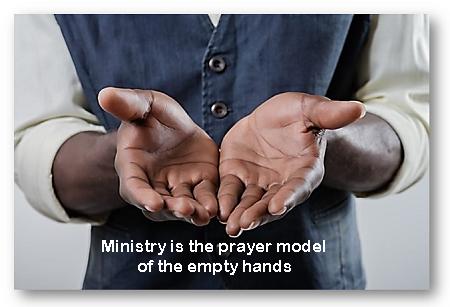The Holy Spirit and the Congregation
The Holy Spirit and the Congregation

Biblical Foundations⤒🔗
Introduction: Shepherds in the Church of Christ←↰⤒🔗
When we speak of the congregation of Christ we do not know or mean any other kind. It is about the church of Christ, which is God’s dwelling place. It is in Christ ‘that the whole building is joined together and rises to become a holy temple in the Lord. And in Him you too are being built together to become a dwelling in which God lives by his Spirit.’ Such is Paul’s instruction to the Ephesians (Eph. 2:21-22). A clearer description of the Trinitarian character of the church can hardly be found. It is implied that the work of the Holy Spirit in the church cannot be described apart from Christ or apart from God the Father.
When dealing with the subject of piety, this has to be kept in mind continually. Especially when the focus is on the influences creeping into the church in our days; and from a distinctive pneumatological point of view, this is most important.
In saying this, I am certain that I am not contradicting the two lectures you have already heard at this conference. How important the practical spiritual meaning of the confession of a Trinitarian God is! This is not just reformed. It is biblical.
When we say ‘church’, implying the piety or the spirituality of the congregation, our thoughts must certainly go to the office-bearers in the church. Ministers and elders have the great responsibility to ‘keep watch over yourselves and all the flock of which the Holy Spirit has made you overseers.’ This is what Paul says to the elders of Ephesus, and he continues: ‘Be shepherds of the church of God, which he bought with his own blood.’ (Acts 20:28). He then goes on to explain most specifically what sort of dangers will threaten the life of the church. This is also recognizable in his letters.
What I mean by these remarks is that, as servants of the church, God gave us a specific responsibility to be aware of the dangers that threaten the congregation in our days. In this lecture I intend to point out a few of these dangers, while making clear that the task of a shepherd in the congregation is most of all a positive one. I gratefully remember the mature and biblical guidance in this respect by the former professor in the Free Church College in Edinburgh – and former shepherd in the Highlands – Douglas MacMillan, in his lectures on Psalm 23 in The Lord Our Shepherd.1 One of his beautiful remarks is:
What is preaching? I don’t know, but I think it rests in what a man is before it rests in what a man says.2
The Work of the Holy Spirit in the Congregation←↰⤒🔗
How important it is to realize that the Holy Spirit is not something, but someone. Sometimes Christians get the impression that there is a sort of competition going on between Christ and the Spirit. Of course, Christ as Head of the Church, his body, is most important for individual Christians as well as for the church as a whole. But the suggestion is then easily adduced that, in concentrating on Christ, we may be in danger of forgetting the Spirit of God. Isn’t he the One from whom we may expect the experiential ‘more’ that is so much needed in the church? Often the Holy Spirit is presented as the source of supernatural power and experiences: ‘God’s empowering presence’.3 Not infrequently, this aspect in a charismatic orientation of reading the Bible has led to a bifurcation of the Christ of grace and the Spirit of power.4

If we see clearly what the work of the Holy Spirit means for the church, it has to be said that his work is not primarily about what he gives, but about who he himself is to people: the Triune God who commits himself in a bond of love to people. It is most essential in the Christian faith that, between God and us, it is not our way to God, but God’s way to us that is decisive. By nature, we are dead in our transgressions and sins; we are objects of wrath (Eph. 2:1-3). That implies the fruitlessness of our search for God. Let it be said from the start that God’s work in men does not turn us off, but rather turns us on. We certainly are called to seek the things above (Col. 3:1), and follow the way of Christ Jesus (Col. 2:6-7), and to live by the Spirit (Gal. 5:16). Jesus spoke about remaining in him and in his word (John 15:5-8; 8:31), but at the same time Jesus most emphatically promised the Spirit, the Comforter, who would come to teach us and to remind us of everything Christ has said to them (John 14:26; 15:26; 16:13-15; cf. 1 Cor. 2:12-16). So our instruction about what we have to do and about what is granted, to us are closely connected to each other.
How it all began←↰⤒🔗
In order to get a proper view of the work of the Spirit of God we must remember how it all began between God and man. In the Old Testament we encounter the Spirit, the Breath of God, as the very condition of life for all creation (Ps. 104:30; Job 33:4). In the New Testament the Lord Jesus speaks of the Spirit who gives life (John 6:63; cf. Rom. 8:2). Such expressions apparently characterize the Spirit of God, in creation as well as in recreation and redemption. True life is from the Spirit of Christ.
This reality of renewal and new life is never without the dark background of sin. It is about people who have become disobedient. And even the specially chosen people of God, Israel, appear to have broken away from God repeatedly. Yet, miraculously, God did not bring his story with man to an end. It certainly would be edifying to go into the details of this divine history, and follow the language of the covenant of God, of the renewal of hearts in the new covenant (Jer. 31, Ezek. 36 & 37). We would find the message of an intimate relationship between God and man, because of the renewing work of the Holy Spirit of God.5
In 1 Corinthians 2 we find that this intimate relationship between God and man is explicitly a mutual one.
We read:
The Spirit searches all things, even the deep things of God.’ And then it says ‘For who among men knows the thoughts of God except the man’s spirit within him? In the same way no-one knows the thoughts of God except the Spirit of God.’ And then the link is made between God and us: ‘We have not received the spirit of the world but the Spirit who is from God, that we may understand what God has freely given us.1 Corinthians 2:10-12
So a reciprocity is given between God and man on the level of the Holy Spirit. We may glimpse into the heart of God, and know his affectionate love for us. An intimate relationship indeed.
Behind this wonderful relationship between God and man is the fact that man was made in the image of God (Gen. 1:26-27). Even the life of man as male and female, being complete only in this togetherness, is a reminder of the fullness of life that God has in himself. Man indeed was meant to live in communion with God. God wanted man to mirror his own fullness. And God wanted to have a creature that would respond to him, and that thus would be responsible. Manifold ways of how this high descent of man is perverted by sin are apparent every day in the world. Even in our own hearts, we who are born again also bear proof of this perversion. We are reformed enough to agree with those expressions in which the reality of the Fall is confessed. I elaborate on this because we, in our times, often forget that between God and man it is the relationship that is essential. The Triune God creates a relationship of love with sinful people, whom he chose to be redeemed to be eternally his people! How could we speak about the church of God, the body of Christ, the temple of the Holy Spirit, apart from this divine intimacy! The essence, indeed, is the relationship. The Holy Spirit is the Pontifex Maximus, the Builder of this holy bridge between God and man. This is most important for the theme of piety!

Relationship and Experience←↰⤒🔗
In our age of course there are several spiritual dangers that are a threat to the church. I don’t intend to present a complete catalogue. What I do know, however, is that one chief temptation creeping into the church is in the field of spiritual experience. Of course, there is no faith without experience. Of course, the Bible has quite a number of expressions that reveal emotions, sorrows, pain, joy, and happiness. Perhaps we might say that the ultimate expression in which all Christian experience is concentrated is the notion of love. We know in human relationships how most of all a loving relationship can release quite a series of emotions and experiences. Unspeakable joy, ultimate expectations, but also deep misery if the relation has grown dark because of guilt or because of afflictions and temptations. This is all applicable in an even stronger manner when the relationship with God is at stake. At the same time, however, the experience of our relationship with God is not just an enlargement of what we may experience in human relationships. The most specific characteristic of our relationship with God is to be found in the idea of faith. Even in the triplet faith, hope and love (see 1 Cor. 13:13) it is faith that precedes love. Yes, the heart of the relationship between God and man – as seen from our side – lies in faith. Moreover, we have to be aware of the fact that faith implies man in his total existence, in which his responsibility is contained. Because, when dealing with the question of being saved or not, all is decided in this one thing: whether we have faith in the Lord Jesus Christ.
Whoever believes in him, is not condemned, but whoever does not believe stands condemned already because he has not believed in the name of God’s one and only Son.John 3:18
When we ask what is meant by living through the Spirit, then exactly the same content must be presented as by living through faith. It is the Spirit who gives faith. Faith is a gift of God (Eph. 2:8). It is the Spirit who makes man to have life in Christ. The Spirit indeed is the Spirit of life (Rom. 8:2). At the same time, the Spirit is characterized by grace: the Spirit of grace (Heb. 10:29) and the Spirit of sonship (Rom. 8:15). All the gifts that may be expected from the Spirit of God – life, wisdom, truth, love, communion with God – are only following faith. Faith indeed is the focus of life with God.
Knowing Jesus Christ Personally←↰⤒🔗
I need hardly stress that all I am saying about faith also implies a central position for the Lord Jesus Christ. Knowing him is the guarantee and at the same time the fullness of salvation. Spiritual life is recognized, not in something man can attain or experience, but in knowing Jesus Christ personally.
To believe means having a relationship. That certainly involves experience. Nevertheless, I must add that not all kinds of religious experience imply faith in Jesus Christ.
This is exactly where discernment is seriously needed in the church of our time. Many emotional, religious, charismatic or other influences of a revival kind promise higher experiences, gladness, power, health, even success and wealth, without being rooted in faith and in a relationship with Christ by grace. I would suggest the reading of Tim Keller’s book on the gospel of Mark, King’s Cross – The Story of the World in the Life of Jesus,6 in which he time and again – listening to the very text of the Scriptures – explains the difference between being religious and having faith. One remark related to this essential character of faith for the experience of a Christian is that a two-stage experience in Christian life is, in my view, an impossible thing. There is nothing higher, or more essential than having a relationship with God in Christ in faith. Unfortunately, I cannot elaborate on that now. I simply realize with these remarks that I cannot possibly follow our late and beloved Dr Martyn Lloyd-Jones in his posthumous publications Joy Unspeakable and Prove all things.7

Recognizing Unbiblical Influences Today←⤒🔗
Categories?←↰⤒🔗
However profitable it might be to demonstrate from church history how, in all ages, the catholic church has been accompanied by movements from within and influences from without, it is not possible to fit that in here. So I will not speak of Montanism, of Gnosticism and mysticism of many kinds, of Joachim of Fiore in the Middle Ages, of enthusiast groups of Anabaptists and spiritualists in the Age of the Reformation. We pass over John Wesley in the 18th Century, and the Holiness Movement in the 19th century. When, following those spiritual streams, we enter the 21st century, we as Reformed Christians are met by spiritual influences from the side of Pentecostalism and the Charismatic Movements. An interesting thing is the different use of the word ‘evangelical’ in different languages. In English it mostly indicates any Bible-believing movement or church. In the German language we must distinguish between ‘Evangelisch’ – which more or less means the same as Protestant or even Reformed8 – and ‘Evangelikal’, which indicates churches and movements from outside the mainstream of Protestantism. Whatever the name, we are surrounded by Pentecostal, Baptist, Methodist or Brethren communities that often do not want to be recognized by some confession, but rather by a spiritual tradition, and often have a strong leadership in the hands of one, or a few, who are strongly influential in the personal lives of their members.
In the Dutch language it is interesting that the word ‘evangelisch’ more or less indicates the same as the German ‘evangelikal’. Moreover, quite a few congregations that used to call themselves Pentecostal or Full Gospel Congregations, now prefer the more moderate term ‘evangelisch’, although this does not mean that their convictions have changed. So we definitely have to be careful with labels, and it is even more necessary to look rather closely at what is going on around us or even in our midst. Our time is, from a spiritual point of view, not one of closed boundaries. Our congregations are being confronted, or even penetrated, by influences of this kind. I have chosen for now to deal with only a few phenomena that need to be distinguished in the light of the Scriptures. Some of the principles I indicated earlier may be helpful in discerning and judging the influences we encounter. My hope and my intention is that looking more closely at only a small part of the range of spiritualities we encounter may help us to develop an ability to distinguish other religious phenomena also.
Songs and Music←↰⤒🔗
There is a genre of Christian songs and hymns from the spirituality of revivalism and praise that may perhaps raise discussion from the musical point of view. My thoughts are that different cultures can produce different styles of music that may be used to the honour of the Lord, although I am afraid that there are some types of music that one should not attempt to Christianize. Leaving these musical aspects aside, in the texts of many of these songs we see an approach to the Christian identity from the angle of experience, touching our feelings, our happiness. There is praise music in which the word “I” can be recognized as the main issue. And this influences us – and not only the younger generation, I might add. Without doubt there is much praise in the Word of God, and certainly in the Book of Psalms. And how becoming that is! Characteristic in these expressions of praise is the word “because”, indicating that the reason of singing and praising is in the Lord. We praise the Lord for all he has given and done.
It is good to praise the Lord, (...) for you make me glad by your deeds, O Lord; I sing for joy at the work of your hands. How great are your works O Lord, how profound your thoughts.Psalm 92:1-5
Here it is not about us, and about what we feel, and how we rejoice in our own act of praising and endlessly repeating the praise... Here it is about the Lord. Not our praise gives us joy, but He does, and therefore it is good to praise his name! That is just one instance of how it is not our own religious experience that is in the centre, but rather our wonderful relationship with the Lord. In faith, the focus is on him, on his grace, on his redemption. How meaningful it is that our spiritual life is God-centred and Christ-centred, and not man-centred!

Ministry Prayer←↰⤒🔗
In order to deal with unbiblical phenomena that surround us in our time, I must make a choice, hoping that looking closer at one specific item might be more fruitful than giving a survey of many movements without being able to identify those properly. A considerable influence in our reformed churches in the Netherlands is exercised by the practice of the so-called ministry-prayer. The ideas behind it are developed by the English female teacher and writer Leanne Payne, who in 1981 founded the PCM – Pastoral Care Ministries. The motive behind her work is to pass God’s Healing Presence to others. In the Netherlands her ideas are followed by the New Wine movement, that is established in a church of reformed confession in Houten (NGK), and that has been very active in organizing Ministry Prayer courses. The influence is considerable, even leading groups of faithful members in congregations to leave their church and seek membership elsewhere. Leanne Payne’s books Listening Prayer, and The Healing Presence continue to play a role in this ministry.9 The method of ministry-prayer is organized by following very detailed instructions. It is important to stick closely to the model. Very specific to the method is the fact that ‘listening to God’ revolves around the themes of prophecy, speaking in tongues, forgiveness, and healing. The theme ‘Listening to God’ in this method is not connected at all with the Word of God as we have it in the Holy Scriptures. The same applies to the ‘practices’ or ‘exercises’ in listening to God. In the guidelines and instructions of ‘New Wine’, the Bible is mentioned as the ‘ultimate standard’.10 I fear, however, that the word ‘ultimate’ in this practice serves to keep the Scriptures at a distance from what is really going on. The ‘passing on’ of thoughts, words and Bible texts that occur in the minds of the team members during the ministry-prayer brings all kinds of impulses from the heart of a human being – the old nature, the thoughts of the flesh included – to the special level of listening to God. The history of the Pentecostal and Charismatic Movements has produced so many examples of thoughts and impulses presented as prophecies from the Holy Spirit, that have, for example, explained away a mistake or even condoned sinful behaviour.11 Many prophecies have been recorded in which the year and the moment of the second coming of Christ were predicted, and they all have proved to be false prophecies. This history should make us suspicious of this method of ‘passing on’ thoughts and messages. Yet, in a very naive way the ministry prayer leads children of God in ways that do not bring them to faith and obedience to the Bible.
One of the aims of the ministry-prayer is ‘bringing someone into the presence of God’. Here also we find a devaluation of the Word, and of the Lord’s promise that ‘where two or three come together in my name, there I am with them’ (Mat. 18:20; cf. John 17:20). We see that it was not necessary for the Lord Jesus to refer to some direct message from the Spirit when he said this. Both the Reformation principle of sola scriptura and the confession of sola fide are violated in such practices.
Prayer or Prophecy?←↰⤒🔗
What must not be neglected is that the main element and the main purpose of the ministry-prayer is not prayer at all. In the New Wine explanations, valuable remarks are made about prayer. What is said about the prayer offered in faith, however, is not applicable to the ministry-prayer, because the essence of this prayer is not prayer but prophecy. It is about receiving direct ‘messages’ from the Holy Spirit.
I quote:
Ministry is the prayer model of the empty hands. God must do it. He is the One who can touch the heart of the other person and renew his or her life.
Any Christian could agree with this statement if it would be about the prayer of faith. It then would refer to the work of the Holy Spirit in regeneration and sanctification. We are led astray, however, if this faith is applied to the invention of the ministry-prayer. In the guidelines for the ministry-prayer we do find a warning to be careful. Things that are passed on to someone with whom the two members of the prayer team pray are presented in a moderate way as ‘a thought’. The formula that is recommended after praying by laying hands on someone is: ‘I was led to think of...’ or some expression like that. The possibility exists that the thoughts that are passed on are not at all from the Holy Spirit, but may be pious words from the mind of man, or even thoughts from the old nature, and therefore sinful. In the guidelines these possibilities are recognized. What, then, is one to think of the ‘passing on’ of the following sentence: ‘I had the compelling thought of a daisy’? The reaction of the lady with whom this team prayed was: ‘Oh, that is my favourite flower!’ Of course this was very striking, and she kept the memory of a very beautiful experience, but upon hearing such examples, we are surely reminded of biblical warnings like Proverbs 30:5-6:
Every word of God is flawless; he is a shield to those who take refuge in him. Do not add to his words, or he will rebuke you and prove you a liar.
Or the word of Paul in 1 Corinthians 4:6,
that you may learn from us the meaning of the saying, 'Do not go beyond what is written.’

The result is precisely the thing we are warned about regarding this: being inflated, by taking pride in one man over against the other. The idea of being puffed up is also employed in the letter to the Colossians, 2:18-19. Paul speaks of a person going into detail of what he has seen – and that was about false humility and the worship of angels – and Paul goes on to say, ‘and his unspiritual mind puffs him up with idle notions.’ And: ‘He has lost connection with the Head, from whom the whole body ... grows as God causes it to grow.’ The interesting thing is that when someone is convinced of having received some extra spiritual quality, the Holy Spirit, in this word of Scripture, qualifies that as being puffed up by an unspiritual mind. This is serious enough to take such warnings to heart. Being puffed up: miserable indeed. It means being filled with nothing but air. If someone should prick it, nothing is left but a miserable feeling of guilt.
It certainly is remarkable, and at the same time deeply alarming, that in the instructions for the ministry-prayer, listening to God is not at all connected to the power of the living Word in the Holy Scriptures. It is about listening to God without mentioning the Word. And so it is the old ideal of an unspiritual climbing up the ladder of experience without listening to what the Lord says in his holy Word.
Backgrounds←↰⤒🔗
In the background of Leanne Payne’s thinking there is something that we need to be aware of. In her book Listening Prayer she makes use of the technique of “visualizing”. If in a prayer meeting we seek to understand the will of God, she commends:
We start by simply imagining with the eye of the heart what we have asked from God.12 She continues: Then God will react to our imagining thinking, correct it or expand it. To see with the eyes of the heart the will of God being executed contains the same principle as when Isaiah says: 'Where there is no revelation, the people cast off restraint.'
We note that not only is this not a word from Isaiah, but from Proverbs 29:18, but also this certainly has no connection with a method of visualizing prayer. Leanne Payne makes clear how she thinks this works:
As in every situation in prayer also we must have a picture of what is good and of the aim we have, otherwise we do not express the faith needed to attain what we pray. This is the creative principle.13
With this method she is related to American charismatic authors like Morton Kelsey, Agnes and John Stanford, who took such thinking from the ideas of the anti-Christian, occult psychiatrist Carl Gustav Jung.14 The same ideas about visualizing can be found in the teaching of the Korean Pentecostal preacher Paul Yonggi Cho. With him the background apparently lies in his former Buddhist practices.
This visualizing that Leanne Payne advocates is nothing more than an occult technique. Nowhere in the Word of God are we taught to imagine the things we pray for so that the prayer will be more effective. The prayer ‘Thy will be done’ points in an entirely different direction!

That this New Wine movement and the operating branches of this influence in Britain and elsewhere are so successful, even in reformed circles, is astonishing. And that so many Bible-believing churches lack the discernment to stay far away from these practices is alarming and distressing. You may notice that in answer to warnings such I am giving now, some may argue that they have experienced the ministry prayer as something very positive, nevertheless. What then will be decisive to us? The rich heritage of prayer, given and explained to us in the Word of God, should cause us not to let ourselves be seduced and led astray from our sincere and pure devotion to Christ (2 Cor. 11:3). Just as it was in the situation with the Corinthians in New Testament times, so it is not imaginary that unbiblical teaching might bring us to a Jesus other than him preached to us, or to a different spirit from the one we received, or to a different gospel from the one we accepted. (2 Cor. 11:4).
Let us be faithful to the Word of God, and faithful to the body of Christ, the congregation, watching as shepherds of the church of God, which Christ bought with his own blood. (Acts 20:28). How necessary since the days of the apostles is a sound sense of discernment to all of us, being pastors or elders in the church!

Add new comment